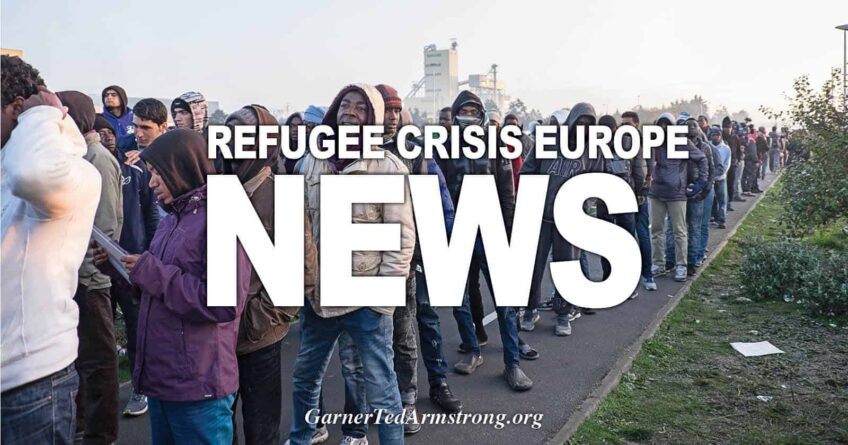This is the story behind the clashes at the Greek border.

Migrants wait to board a ferry in the port of Mytilene, on the island of Lesbos, Greece, on March 20. (Vangelis Papantonis/AP)
What has provoked the current migration crisis and what will happen now?
Buses from Istanbul transported Syrian and Afghan migrants to the no man’s land between Greece and Turkey — but Greek border guards violently repelled them with tear gas and stun grenades. On March 2, 22-year-old Aleppo-born Mohamed El-Arab died after being hit by a rubber bullet.
The same day, Greek authorities announced 1,300 migrants had landed in the Greek islands. Greek coast guard patrols tried to turn away dinghies coming from Turkey, sometimes shooting at them. The Greek island of Lesbos descended into chaos as masked militias, Greek, Austrian and German neo-Nazis, and some locals attacked migrants, NGO staff and journalists.
The E.U. wants to keep people out
The background to this crisis is a 2016 joint statement between Turkey and the European Union. Turkey effectively agreed to help prevent an influx of refugees to Europe — a far easier solution for the E.U. than reaching internal agreement about which countries would accommodate the thousands of refugees heading north. In return, the E.U. agreed to provide Turkey with up to $6.7 billion. Furthermore, for every Syrian on the Greek islands who were readmitted in Turkey, an E.U. country would accommodate a Syrian refugee.
The deal reflects a long-standing E.U. policy of “cooperation with sending and transit countries.” Over the past 20 years, the E.U. has spent a lot of time and money trying to convince third states to beef up their own borders and prevent those who want to reach Europe from getting there. For example, in the 2015 La Valetta summit on migration, E.U. governments pledged $4 billion for an Emergency Trust Fund for Africa dedicated to “stability and addressing root causes of irregular migration and displaced persons.”
But Erdogan says the E.U. isn’t respecting its side of the deal. The Turkish government has also called for more NATO support in northern Syria.
Turkey hosts almost 3 million Syrians, and more refugees than any other country in the world, and is facing a major economic downturn. Greek and other European leaders have retorted that Turkey is resorting to blackmail, and using the refugees it is letting through as human pawns.
E.U. policy imposes costs on potential migrants
The deal with Turkey was never a formal legal agreement, but it did have consequences. Migrants were crowded into E.U. “hot spots” — camps on several Greek islands — where they were supposed to be registered and screened before their fate was decided on.
But Greek officials allowed few to transfer to the mainland and few were accepted by other E.U. countries. The migrants that remained had to live in unsanitary and dangerous conditions, in perpetual fear of being returned to Turkey or their home country. By late 2019, there were about 40,000 migrants throughout the Greek islands.
U.N. and regional Greek authorities have called for the closure of the Moria camp on Lesbos for almost two years, citing overcrowding problems and sexual abuse. Doctors Without Borders, for instance, reports its doctors are treating camp children who self-mutilate and attempt suicide.
Even before February, the situation seemed explosive. E.U. and Greek authorities were effectively relying on Turkey to prevent migrants from crossing into Europe, and to readmit people living in camps. The E.U. borders agency Frontex claimed the deal was working, publishing statistics that showed a drastic fall in migrant numbers coming via the “Eastern route” in 2016 and 2017. While arrivals did fall in those years, 32,494 people arrived in Europe by sea in 2018, and 59,494 in 2019, as confirmed by UNHCR.
E.U. leaders reacted quickly
French President Emmanuel Macron tweeted on March 1: “Full solidarity with Greece and Bulgaria.” On March 2, E.U. leaders Ursula von der Leyen, Charles Michel and David Sassoli, respectively the presidents of the European Commission, Council, and Parliament, traveled to Kastanies, at the Greek-Turkish border. Von der Leyen announced the deployment of a Frontex rapid intervention border operation with a navy ship, two coast guard patrols, two helicopters, and a plane as well as $760 million in assistance for Greece.
The E.U. officials did not mention violence against migrants or attacks on NGO personnel, although the European Commission is the “guardian of the treaties” that set out the fundamental values of the European Union. These include the rule of law and respect for human rights and the international asylum conventions that Greece has knowingly breached by using force to repel migrants at the border.
Instead, E.U. leaders emphasized the need for more military help to step up border control. Only a couple of countries (notably Portugal) have agreed to welcome some Syrians and 1,500 minors at risk in E.U. hot spots.
The E.U.’s position reflects weakness rather than strength
My research on migration in Europe suggests that, despite all its bluster, the E.U. is in a weak position. Because it cannot reach internal agreement on how to accommodate refugees and migrants, it has to rely on third countries like Turkey, which can use the E.U.’s strategic vulnerability to further their own agendas. For example, in 2004, Libyan leader Moammar Gadaffi agreed to stem sub-Saharan migration in exchange for E.U. recognition and the resumption of diplomatic relations.
Turkey is pressing for both E.U. and NATO support in the Syrian conflict. Europe’s sole focus on migration provides incentives for countries such as Turkey to raise the stakes by threatening to stop cooperating.
When “partnerships” about border control fail, the E.U. may find its only alternative is to increase the budget and mandate of Frontex and to finance the building of walls and camps that only temporarily change migration routes, at a high human cost.
Virginie Guiraudon is CNRS Research Director at the Sciences Po Center for European Studies in Paris.










